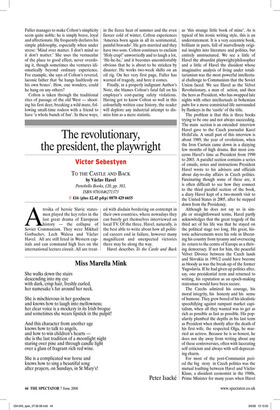The revolutionary, the president, the playwright
Victor Sebestyen
TO THE CASTLE AND BACK by Václav Havel Portobello Books, £20, pp. 383, ISBN 9781846271373 ✆ £16 (plus £2.45 p&p) 0870 429 6655 Atroika of heroic Slavic statesmen played the key roles in the last great drama of European history — the collapse of Soviet Communism. They were Mikhail Gorbachev, Lech Walesa and Václav Havel. All are still feted in Western capitals and can command high fees on the international lecture circuit. All are treat ed with disdain bordering on contempt in their own countries, where nowadays they can barely get themselves interviewed on local TV. Of the three, Havel, naturally, is the best able to write about how all political careers end in failure, however many magnificent and unexpected victories there may be along the way.
Havel describes To the Castle and Back as ‘this strange little book of mine’. As is typical of his ironic writing style, this is an understatement. It is a very eccentric book, brilliant in parts, full of marvellously original insights into literature and politics, but entirely unstructured. We see a little of Havel the absurdist playwright/philosopher and a little of Havel the dissident whose imaginative analysis of living under totalitarianism was the most powerful intellectual challenge to Communism that the Soviet Union faced. We see Havel as the Velvet Revolutionary, a man of action, and then the hero as President, who has swapped late nights with other intellectuals in bohemian pubs for a more constricted life surrounded by flunkeys in the ‘castle’ of the title.
The problem is that this is three books trying to be one and not always succeeding. The main section is an extended interview Havel gave to the Czech journalist Karel Hvížd’ala. A small part of this interview is about 1989, the year of revolutions, when the Iron Curtain came down in a dizzying few months of high drama. But most concerns Havel’s time as President from 1990 to 2003. A parallel section contains a series of emails, notes and instructions President Havel wrote to his advisers and officials about day-to-day affairs in Czech politics. Fascinating though some of these are, it is often difficult to see how they connect to the third parallel section of the book, a diary Havel kept of a two-month visit to the United States in 2005, after he stepped down from the Presidency.
Although he does not say so in simple or straightforward terms, Havel partly acknowledges that the great tragedy of the third act of his life was that he stayed on the political stage too long. His great, historic achievements were his role in liberating his country from tyranny and overseeing its return to the centre of Europe as a thriving democracy. If not for him, the peaceful Velvet Divorce between the Czech lands and Slovakia in 1991/2 could have become as bloody as was the break-up of the former Yugoslavia. If he had given up politics after, say, one presidential term and returned to writing, his reputation as an epoch-making statesman would have been secure.
The Czechs admired his courage, his moral integrity, his honesty and his sense of humour. They grew bored of his idealistic speechifying against rampant market capitalism, when all they wanted was to get as rich as possible as fast as possible. His popularity plumbed the depths in his last term as President when shortly after the death of his first wife, the respected Olga, he married an actress. Because he is so honest, he does not shy away from writing about any of these controversies, often with lacerating self criticism and always with self-deprecating charm.
For most of the post-Communist period the big story in Czech politics was the mutual loathing between Havel and Václav Klaus, a dissident economist in the 1980s, Prime Minister for many years when Havel was President, and his successor (and still the resident) in the castle. Long passages of this book, where Havel scores points against various opponents or complains about the behaviour of the other Václav on issues long forgotten by everyone else, read like any other politician’s memoirs.
Yet elsewhere the writer and philosopher Havel makes observations on subjects no other politician of recent times would have touched. In particular, he devotes a fascinating chapter to politics as theatre because ‘politics has to work with signs, symbols, rit uals ... which often convey the meaning of what is happening.’ And who else, out of power, can look forward to this life afterwards? Before the 1989 Revolution he was working on a play — inspired by The Cherry Orchard and King Lear — about a statesman who has lost his position, is forced to move out of the official residence, cannot accept it and goes mad. Recently he completed the play, called The Leaving, and it has just opened in a Prague theatre, a neat companion work to this quirky memoir.











































































 Previous page
Previous page